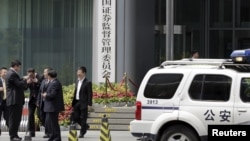This week’s series of mail bombings in China’s Guangxi province has led to expectations that the government will more closely regulate the country’s parcel delivery service, a backbone of the burgeoning e-commerce industry.
Those behind the blasts apparently hired individuals to deliver parcels across the city, leading to explosions in at least 18 locations that killed seven people and wounded some 50 others.
Analysts say the attacks are likely to lead to new safety standards and rules for an industry that is only lightly regulated.
“It’s the government’s responsibility to provide oversight for businesses that impact public safety. I think the government will step in,” Joseph Baladi, managing partner of consulting firm Brand Asian said.
Not terrorism
Initial reports of investigations suggest that the police do not consider the crime to be the handiwork of an organized gang of terrorists.
“Chinese authorities have been eager to describe many violent incidents as terrorists attacks. Given that, I think there is less chance this was the work of terrorists. But the methodology used could be a cause of worry,” said Andrew Small, terrorism expert and Transatlantic Fellow at The German Marshall Fund of the United States.
E-commerce industry sources said courier companies thrive on their capacity to organize fast deliveries at extremely low rates, and there is very little attention to safety issues. The bombing incident has exposed weakness in delivery systems that do a poor job of tracking shippers and the contents of their packages.
Stolen mail, mixups
Jacob Cooke, chief executive officer of consulting company Web Presence in China, said there are a lot of loopholes in the parcel delivery system. In one case, an American insurance company found that documents it was sending to its customers were replaced with papers from a Chinese insurer.
“There are a ton of cases of mail being stolen, real products being switched fakes,” Cooke said.
Citing the case of an Alibaba-owned e-commerce platform, he said, “Taobao shops can use any third party delivery services. Alibaba does not control shipping on any one of their properties.”
Other executives say the incident only reinforces why they have gone to the trouble of running their shipping departments internally.
An official from JD.com, regarded as the second biggest online retailer in China after Taobao, said there is no chance his company’s logistics can be manipulated for any wrongdoing.
"I don't expect much impact of the Guangxi incident in our operations because we own the entire process, warehousing, shipping and distribution,” Josh Gartner, director of international communications for JD.com said.
China Delivery Services Scrutinized After Parcel Bomb Blasts

BEIJING —



